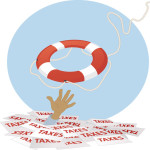Pay off debt first or start saving now?
It’s a debate almost as convoluted as which came first, the chicken or the egg?
Experts heatedly take opposite sides.
You get rid of debt faster if you put all available cash into paying off balances.
BUT
You have no reserves for the unexpected if you spend everything that comes in.
After much thought, and triggered by new research, I’ve got my answer.
Start saving now.
I am convinced habits are more powerful than arithmetic.
Pay debts first is cheaper
In a world where your savings earn 1 or 2% annual interest, while credit cards cost 15-25%, it’s clear your net worth benefits from paying debt first.
The biggest bang for your buck, dollars and sense wise, comes from paying off debt.
Unless, of course, you have an unexpected expense and find yourself without funds to pay. Then, short term borrowing is usually on even worse terms than credit cards.
But, hang arithmetic, I say. And I’m married to a mathematician.
Your balance sheet isn’t everything.
Habits drive the bus
We underestimate the power of habits. Get the savings habit. Even when you’re in debt.
Put a bit of your income aside every paycheck.
Dictionary.com says a habit is an acquired behavior pattern regularly followed until it has become almost involuntary:
Most of us have a bad habit on the subject of savings: we label “saving” as something we can put off til later.
Later
- When there are fewer demands on our money.
- When our income has increased.
- When the kids are grown
- When the house paid off.
Whatever it it, we’ve created a habit of thinking that savings can wait til later. That saving will be easy at some future time, whereas it’s hard now.
Only for most of us, no matter what life benchmark we’ve passed, savings never looks easy. Or immediately rewarding.
So, it’s not easy. It’s just essential.
Essential for a stable financial life.
Start small building the savings habit
You don’t have to jump head first into the gold standard “set-aside of 10-20% of your income.”
If you’ve got debts from your past, it’s probably not really feasible.
Start small. Save $30 bucks a month this month.
Save $35 next month. And so on.
Pay down your debts, but cultivate that saving habit.
Don’t allow yourself to think that saving is discretionary. That’s a nasty habit.
Yes, saving while you’re paying interest on old debts slows your climb out of debt.
But the savings habit gets stronger.
As your debt shrinks, your rate of savings can increase.
Along with your peace of mind.
That’s where I come down on which comes first: paying off debt or savings.
It’s not one or the other.
More
The most powerful debt management tool: not what you think






